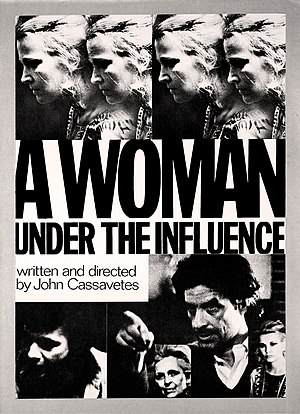A Woman Under the Influence
Jump to navigation
Jump to search
The following work contains material and themes that may include coarse language, sexual references, and/or graphic violent images that may disturb some viewers. Mature articles are recommended for those who are 18 years of age or above. If you are 18 years old or above, or are comfortable with mature content, you are free to view this page; otherwise, you should close this page and view another one. Reader discretion is advised. |
"A tornado of raw emotions and virtuosic camerawork, John Cassavetes’s beloved masterpiece charts the disintegration of a Californian housewife. In a volatile yet vulnerable performance that has inspired generations of performers, Gena Rowlands buckles under the impossible weight of crumpled dreams."
— MUBI's take
| A Woman Under the Influence | ||||||||||||||||||||||||||||
|---|---|---|---|---|---|---|---|---|---|---|---|---|---|---|---|---|---|---|---|---|---|---|---|---|---|---|---|---|
This film has been preserved in the National Film Registry in 1990.
| ||||||||||||||||||||||||||||
 | ||||||||||||||||||||||||||||
|
A Woman Under the Influence is a 1974 American drama film written and directed by John Cassavetes. The story follows a woman (Gena Rowlands) whose unusual behavior leads to conflict with her blue-collar husband (Peter Falk) and family. It received two Academy Award nominations, for Best Actress and Best Director.
Why It Rocks
- The story focuses on the marital and mental problems affecting a blue-collar family.
- John Cassavetes pretty much pioneered American independent film for the 1970s with his use of cinéma vérité in fictional narrative. Plus the film's one of the first feature films to be successfully self-distributed.
- Cassavetes' visual style of long takes, little concern for lighting, and handheld cameras help make the events seem realistic and "convince the audience (…) that what's on the screen is really happening."
- About half the film was shot with telephoto lenses, which kept the camera at a distance from the actors
- Although the film may not have a true narrative, it still maintains an overall idea, which is a concept of how much you have to pay for love.
- Great and definitive performances from Gena Rowlands and Peter Falk.
- The film is pretty personal and a self-portrait for the director, as Mabel Longhetti was based on Cassavetes himself (even though she's a female) and her situation was John's representation of his own life.
- Mabel was the director's reflection on the pressures he felt he was subjected to not only by marriage but, more generally, by social conventions and expectations of what is and is not “normal” and “acceptable” behavior.
The Only Bad Quality
- It can often be uneven, overlong, or contain weird decisions from some of the actors.
Trivia
- A Woman Under the Influence, Killer of Sheep, and Meshes of the Afternoon are the first independently produced films to be inducted into the National Film Registry.
Comments
Loading comments...